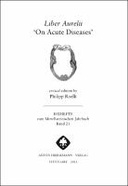Explore

The Liber Aurelii is a Latin medical text apparently compiled in Late Antiquity. It is the first part of a largely therapeutic two-volume work, which treats acute diseases. The author’s name is fictitious and unknown to the most original manuscripts. The work is thus a (rather successful) anonymous compilation, which uses primarily methodic sources, especially Soranus of Ephesus (2nd century AD). Not least due to the textual tradition’s complexity, only a single late manuscript has so far been printed in 1847. In addition to the direct transmission represented by five manuscripts, there is an abridged and slightly revised version in nine manuscripts. Gariopontus, an eleventh century physician, also quoted almost the entire text in his still unedited Passionarius, sometimes in slightly revised form. His exemplar was better than the archetype of the direct transmission. The present edition reconstructs an archetype text of the direct transmission (approximately eighth century). On facing pages, the text forms of the abridged version and of Gariopontus are edited synoptically. The differences between the versions show how physicians of the High Middle Ages tried to make sense of the often corrupted text. The corrupted archetype text is only minimally interfered with in the edition; a special apparatus presents the editor’s suggestions for improvement. The unusual technical vocabulary of the text is made accessible by a glossary at the end of the edition.
This book is included in DOAB.
Why read this book? Have your say.
You must be logged in to comment.
